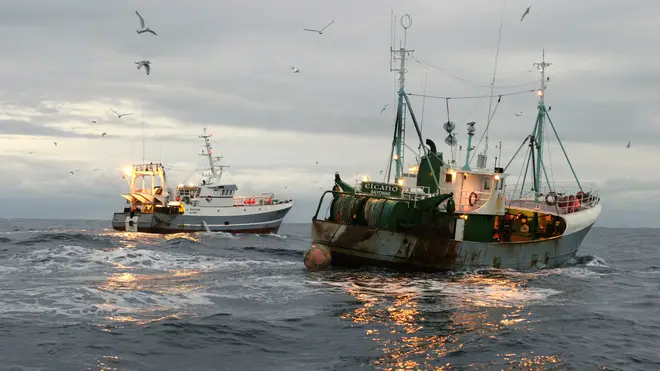
Paul Brand 10am - 12pm
6 October 2021, 14:04 | Updated: 6 October 2021, 14:52

French fishermen have threatened to block the port of Calais in the run-up to Christmas, stopping exports to the UK, in a growing row over fishing rights.
They claim the UK government has deceived them by failing to grant enough post-Brexit fishing licences to access British waters.
"As far as French fishermen in northern France are concerned, in the absence of any results, the blocking of the port of Calais and exports to the United Kingdom for the period leading up to Christmas is an option," said Olivier Lepretre, president of the powerful fishing committee for the northern Hauts-de-France region.
READ MORE: Jacob Rees-Mogg hails Jeremy Corbyn for 'helping save Brexit'
READ MORE: James O'Brien reacts as ex-Brexit Secretary blames driver shortage on industry
The government in London announced last month it had approved just 12 of the 47 applications it had received from French small boats, sparking fury across the English Channel.
Those denied licences were unable to prove a track record of fishing activity in the six-to-12 nautical mile zone in the years before the UK's departure from the EU, according to a UK government spokesman.
But the Hauts-de-France fishing committee said the French have worked "meticulously" to provide that evidence, calling the British allocation an "unacceptable decision".
Mr Lepretre's threat came a week after he held talks with French maritime minister Annick Girardin, who has asked the European Commission for possible retaliatory measures.

James O'Brien clashes with an ex-Brexit Party MEP on fishing
Ms Girardin met virtually with France's Europe minister Clement Beaune and MEPs Pierre Karleskind and Nathalie Loiseau to "defend the rights of our fishermen", according to a Wednesday tweet by Ms Loiseau.
"They don't have to pay the price for #Brexit," she posted, pledging "calmness, firmness and determination".
A day earlier, Mr Beaune said France would "take European or national measures to exert pressure on the UK", and hinted that Britain's energy supply could be disrupted in retaliation for a lack of access to UK waters.
The UK's Brexit minister, Lord Frost, said it was "unreasonable" to suggest the UK was acting in bad faith when it came to allocating post-Brexit fishing licences to French boats, accusing France of being disingenuous over the UK's position on fishing access.
"We have been extremely generous and the French, focusing in on a small category of boats and claiming we have behaved unreasonably, I think is not really a fair reflection of the efforts we have made," he told a Conservative Party conference fringe event on Tuesday.

'Yes the bulk of the fishing industry voted for Brexit but it's the terms we have to work under now'
"The Government has this year issued a large number of licences to EU vessels seeking to fish in our exclusive economic zone (12-200 nautical mile zone) and our territorial sea (six-12 nautical mile zone)," a UK government spokesman said.
The spokesman added that the approach had been "fully in line" with the UK's commitments in the Trade and Co-operation Agreement, which was agreed as part of the Brexit divorce deal.
The cross-Channel tensions over fishing have been long-running, with earlier rows leading to Navy ships being scrambled to Jersey amid concerns of a blockade of the island.
It is also not the first time the French have used the energy supply threat to try to gain ground in the Brexit row.
In May, Ms Girardin warned France was ready to take "retaliatory measures" after accusing Jersey of dragging its feet over the issuing of licences to French boats under the terms of the UK's post-Brexit trade deal.
Jersey gets 95% of its electricity supply from France, with just under half of the UK's electricity imports, as of 2020, coming from the same source.